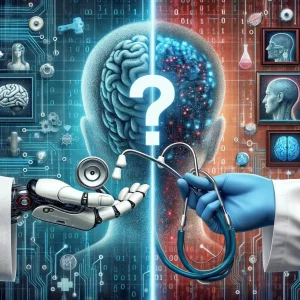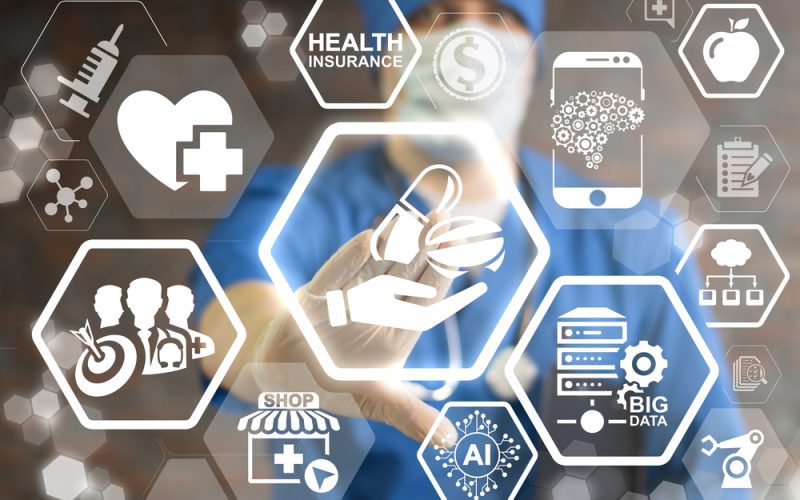AI in Healthcare: Revolutionizing Medicine and Patient Care
Artificial Intelligence (AI) is reshaping healthcare, enabling breakthroughs in diagnostics, treatment, and patient management. From enhancing disease detection to revolutionizing drug discovery, AI is making healthcare smarter, faster, and more personalized. This article explores the diverse applications of AI in healthcare, examining its benefits, real-world examples, and case studies.
The Role of AI in Early Disease Detection

AI-Powered Diagnostic Tools
AI’s most profound impact has been in early disease detection, where machine learning (ML) algorithms are now trained to identify medical conditions before they become critical. AI can analyze medical imaging data (such as X-rays, CT scans, and MRIs) to spot early signs of diseases like cancer, heart disease, and neurological disorders. These AI models are built on vast datasets, which teach them to recognize patterns and detect anomalies far more accurately than human doctors.
Example: AI in Breast Cancer Detection
A leading example is Google’s DeepMind, which has developed AI models capable of diagnosing breast cancer more accurately than human radiologists. In clinical trials, AI detected 94.6% of breast cancers, significantly outperforming human counterparts, whose accuracy hovered around 88%. Such technology has the potential to save lives by detecting cancer at its earliest stages, when treatment outcomes are most favorable.
Benefits
- Increased Accuracy: AI-powered systems reduce human error, leading to more accurate diagnoses.
- Time Efficiency: AI tools can process hundreds of images in seconds, expediting diagnoses and allowing doctors to focus on treatment.
- Better Patient Outcomes: Early detection allows for timely intervention, improving survival rates and treatment effectiveness.
AI in Drug Discovery and Development
Speeding Up Drug Discovery
AI is transforming the pharmaceutical industry by significantly reducing the time it takes to discover new drugs. AI algorithms can analyze vast databases of chemical compounds and predict their effects on the body, enabling researchers to find promising molecules more quickly.
Case Study: AI in COVID-19 Vaccine Development
AI played a crucial role in the development of the COVID-19 vaccines. Companies like Moderna and BioNTech used AI to analyze the virus’s genetic code, identifying potential vaccine candidates much faster than traditional methods. These AI-driven insights were integral to the rapid development and approval of vaccines.
Benefits
- Accelerated Development: AI can identify viable drug candidates faster, cutting down development time.
- Cost-Effective: By predicting the efficacy of compounds early in the process, AI helps reduce the costs of drug testing.
- Improved Precision: AI ensures more targeted therapies with higher success rates, reducing the likelihood of trial-and-error in treatment development.
Personalized Medicine Through AI
AI for Tailored Treatments
Personalized medicine, where treatments are tailored to individual patients based on their genetics, lifestyle, and other factors, has been revolutionized by AI. Machine learning algorithms analyze patient data to recommend the most effective treatments for each individual.
Example: IBM Watson Health in Oncology
IBM Watson uses AI to analyze clinical data, including medical records, research papers, and clinical trials, to recommend personalized cancer treatments. It has been successfully implemented in oncology, where it analyzes genomic data to find the best therapy for a patient’s specific type of cancer. This approach ensures that patients receive targeted, more effective treatments, rather than one-size-fits-all solutions.
Benefits
- Better Treatment Outcomes: Personalized treatments lead to higher success rates, especially for complex conditions like cancer.
- Fewer Side Effects: By targeting treatments more precisely, AI helps minimize the side effects that come with traditional therapies.
- Holistic Patient Care: AI can analyze a wide range of data, from genetic information to lifestyle factors, ensuring a more complete understanding of each patient’s needs.
AI-Driven Clinical Decision Support Systems

AI-Assisted Decision-Making
Clinical decision support systems (CDSS) use AI to assist healthcare professionals in making real-time decisions about patient care. These systems analyze patient data and recommend potential diagnoses, treatment plans, or medical procedures.
Example: Aidoc in Radiology
Aidoc’s AI-powered platform analyzes radiology images to assist doctors in identifying critical conditions, such as brain hemorrhages or fractures, that require immediate attention. The system flags potential abnormalities, allowing healthcare providers to act quickly and efficiently. In some cases, AI-driven tools like Aidoc have outperformed human radiologists in speed and accuracy.
Benefits
- Reduced Human Error: AI can process data without fatigue, reducing the risk of oversight.
- Faster Decision-Making: With AI providing instant analysis and recommendations, doctors can make decisions more quickly, improving patient outcomes.
- Efficiency in Workflow: AI reduces the administrative burden on healthcare providers, enabling them to spend more time with patients.
The Rise of Robotic Surgery with AI
AI-Powered Robotic Systems
Robotic surgery systems use AI to enhance the precision and accuracy of surgeons during procedures. These systems assist with real-time data analysis, helping doctors navigate and perform surgeries with greater control.
Example: da Vinci Surgical System
The da Vinci Surgical System is one of the most advanced robotic surgery platforms. It uses AI to enhance a surgeon’s precision during minimally invasive surgeries. AI enables better visualization of surgical sites and even makes suggestions based on real-time data, assisting the surgeon throughout the operation.
Benefits
- Minimally Invasive: AI-driven robotic systems allow for smaller incisions, reducing recovery times and the risk of complications.
- Greater Precision: Surgeons benefit from enhanced precision in delicate procedures, improving outcomes and reducing the risk of human error.
- Reduced Hospital Stay: Faster recovery times mean that patients spend less time in the hospital, improving overall healthcare efficiency.
Natural Language Processing (NLP) in Healthcare
Extracting Insights from Medical Texts
Natural language processing (NLP) enables AI systems to process and analyze unstructured text data in medical records, doctor’s notes, and research papers. By extracting relevant information, NLP can provide deeper insights into patient conditions, treatments, and outcomes.
Example: Tempus and AI in Oncology
Tempus, an AI company, uses NLP to analyze clinical and molecular data to improve cancer treatment. Their platform examines patient records, including clinical notes and medical literature, to recommend personalized therapies based on the latest research and patient history.
Benefits
- Improved Decision-Making: By processing vast amounts of medical text, NLP provides doctors with up-to-date and relevant information, aiding decision-making.
- Time Efficiency: NLP automates data extraction, saving healthcare professionals from manually reviewing patient records.
- Data-Driven Insights: NLP algorithms can identify trends and correlations in large datasets, improving diagnosis and treatment recommendations.
Virtual Health Assistants Powered by AI
AI in Patient Communication
Virtual health assistants powered by AI are helping to bridge communication gaps in healthcare. These assistants can answer patient queries, provide information about medications, and even help with scheduling appointments.
Example: Ada Health AI Assistant
Ada Health is an AI-driven chatbot that helps patients identify potential medical conditions based on their symptoms. It asks users a series of questions and uses AI to recommend possible diagnoses, which patients can then discuss with their healthcare provider. This service increases patient access to healthcare information and reduces the burden on doctors.
Benefits
- 24/7 Access: AI assistants provide patients with around-the-clock access to healthcare advice and information.
- Improved Patient Engagement: By providing instant responses to common queries, AI helps keep patients informed and engaged in their care.
- Cost-Effective: AI assistants reduce the need for human intervention in routine administrative tasks, lowering operational costs.
Remote Patient Monitoring Using AI

AI in Wearables and IoT Devices
AI integrated with wearable devices and IoT technology enables remote monitoring of patients. AI can analyze health data collected by these devices to detect changes in a patient’s condition, even before symptoms appear.
Example: AI in Managing Chronic Conditions
AI tools like wearable heart monitors or glucose trackers help patients with chronic conditions such as diabetes or heart disease. These devices continuously track vital signs and send alerts to healthcare providers if any anomalies are detected, allowing for immediate intervention.
Benefits
- Continuous Monitoring: AI provides real-time monitoring, which is especially beneficial for patients with chronic conditions.
- Proactive Care: AI alerts healthcare providers of potential issues before they become critical, enabling proactive intervention.
- Better Patient Outcomes: By identifying issues early, AI helps improve long-term health outcomes for patients.
AI in Mental Health Diagnosis and Support
AI for Mental Health
AI is being increasingly used in mental health to analyze speech patterns, facial expressions, and social media activity to detect signs of depression, anxiety, and other mental health conditions.
Example: Woebot AI Therapy App
Woebot is an AI-driven therapy chatbot that helps users manage mental health issues by providing Cognitive Behavioral Therapy (CBT) through conversation. Woebot uses AI to analyze user responses and offer personalized therapy and coping strategies.
Benefits
- Accessible Care: AI-powered mental health tools make therapy more accessible to people who may not otherwise seek help.
- Immediate Support: AI provides on-demand support, allowing users to manage their mental health at any time.
- Non-judgmental Assistance: AI offers a confidential and non-judgmental platform for individuals to seek help.
Ethical and Regulatory Challenges of AI in Healthcare
Addressing Ethical Concerns
AI’s rapid adoption in healthcare raises important ethical questions, such as data privacy, algorithmic bias, and the role of human oversight. Regulatory frameworks must evolve to ensure the responsible and transparent use of AI in medicine.
Benefits
- Accountability: Ensuring AI systems are transparent and understandable helps mitigate risks of misuse.
- Bias Reduction: Addressing bias in AI algorithms ensures more equitable healthcare delivery.
- Data Privacy: Regulations like HIPAA help protect patient data in an era of AI-driven healthcare.
AI’s Impact on Reducing Healthcare Costs
Cost Savings with AI
AI contributes to healthcare cost reduction by automating repetitive tasks, improving resource allocation, and minimizing the need for costly treatments through early detection.
Benefits
- Operational Efficiency: AI-driven automation streamlines administrative tasks, reducing costs.
- Preventive Care: Early detection and personalized treatments can prevent costly complications.
- Better Resource Allocation: AI helps optimize hospital workflows, reducing waste and improving service delivery.
Future of AI in Healthcare: What’s Next?

The Next Frontiers
The future of AI in healthcare promises even more advanced applications, including the integration of quantum computing, AI-driven drug development, and expanded use in global health management.
Benefits
- Global Healthcare Access: AI can extend healthcare services to underserved regions.
- Predictive Healthcare: AI models will enable predictive healthcare, preventing diseases before they manifest.
- Collaboration: AI companies and healthcare providers will collaborate to create more efficient and patient-centric healthcare systems.
Conclusion
AI is transforming healthcare in profound ways, from improving diagnostics and treatment to enhancing patient engagement and care delivery. As technology continues to evolve, AI will play an even more pivotal role in shaping the future of medicine. The benefits of AI, such as increased efficiency, better patient outcomes, and reduced costs, demonstrate its potential to revolutionize the healthcare industry.












